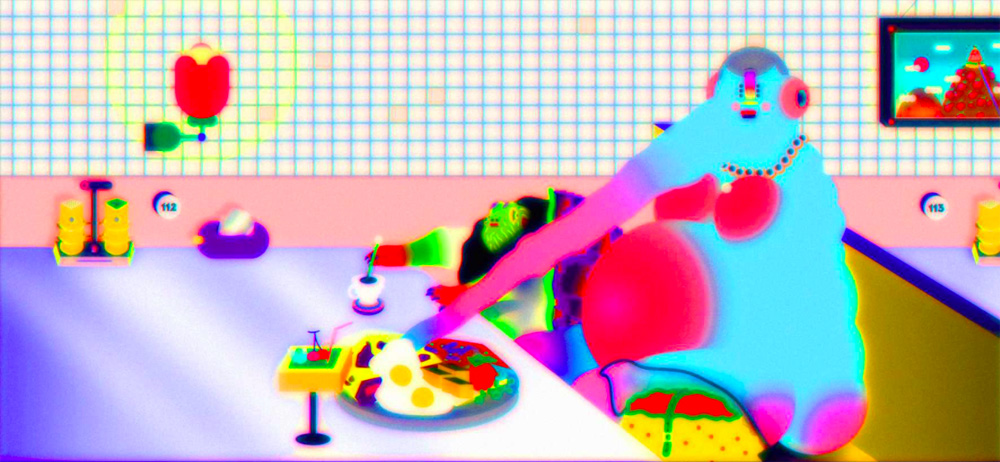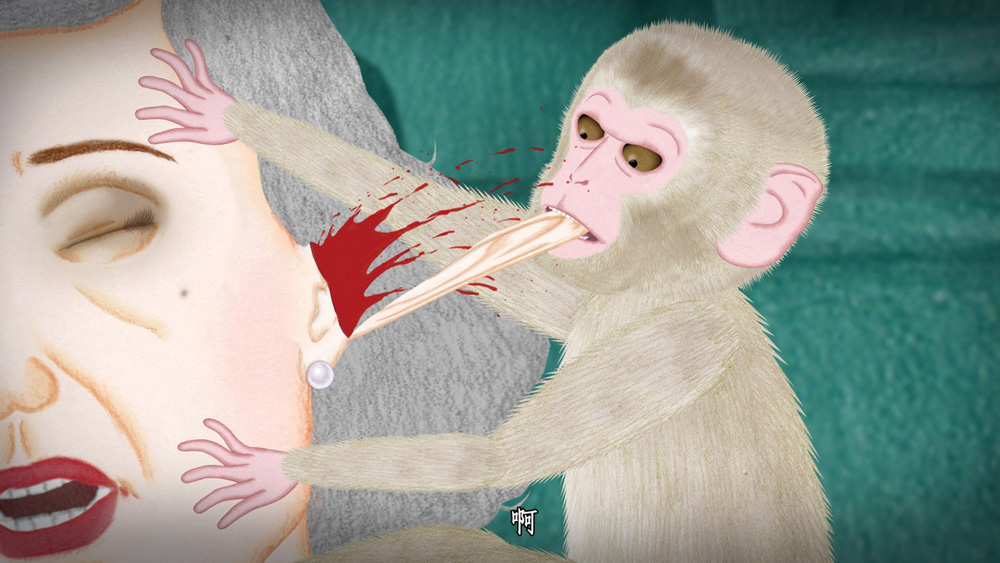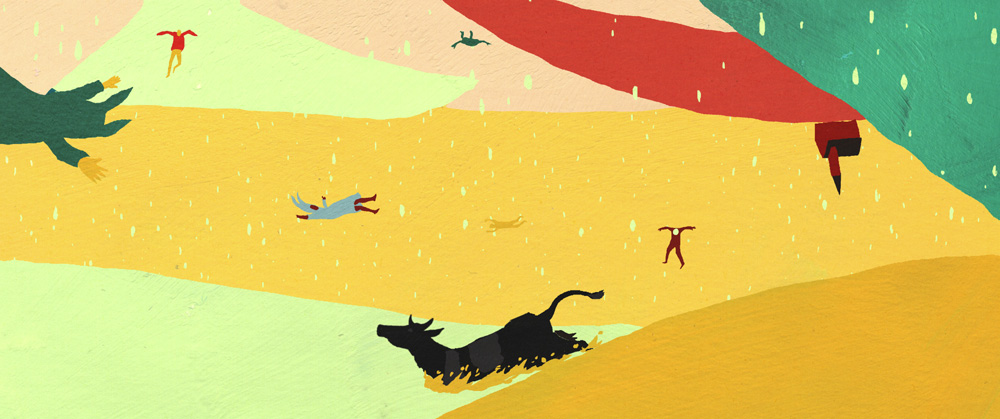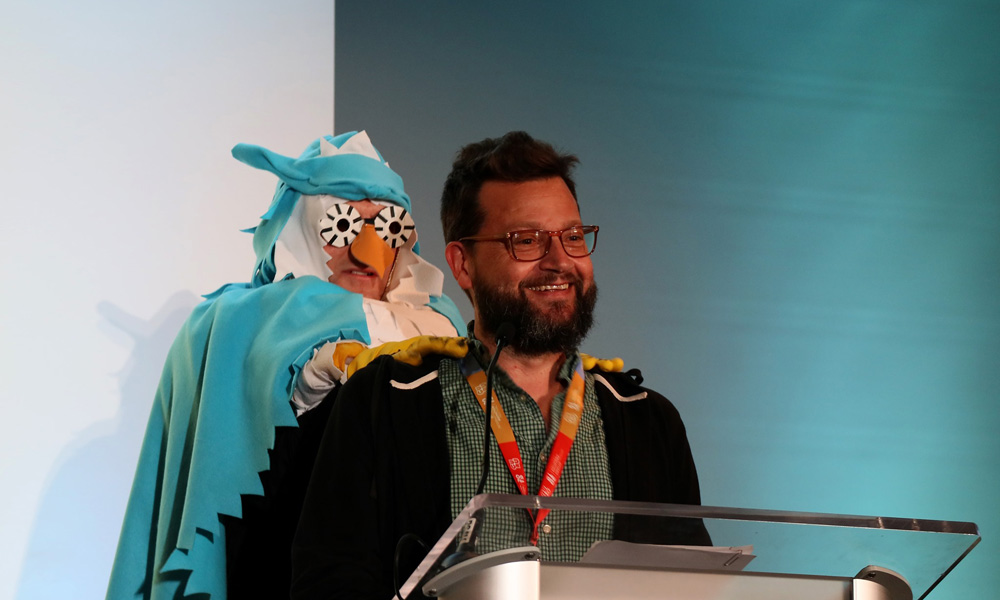***This interview originally appeared in the Sept./Oct. ’21 issue of Animation Magazine (No. 313)***
We had a chance to chat with Ottawa International Animation Festival (OIAF) director Chris Robinson to get this take on this year’s fantastic virtual edition. Here is what he told us:
How does it feel to have a virtual event for the second year in a row?
Chris Robinson: I didn’t like having to do it last year, but it turned out to be a lot better than I imagined. That said, I was sure that would be the only time we’d have to do an online OIAF … so when we decided internally last spring that OIAF21 had to be online, I was not pleased. I was probably the only one on staff who was worried we were being too conservative and acting too quickly, but having had some time to see what’s unfolded, I think it was the best choice for 2021.
There’s so much uncertainty about variants, but more than that the border with the U.S. remains (at least on land) closed … and a lot of folks still aren’t comfortable with flying just yet. We could access some cinemas, but there would be capacity limits. We don’t own our cinemas, so it really doesn’t make sense to rent a cinema when we can’t fill it or even come close to filling it because of restrictions.

Did you learn any lessons from the 2020 edition that you applied to this year’s festival?
It was a lot more intimate than I imagined it would be. The other thing that stuck with me was to avoid pre-recorded talks as much as possible. Joel Frenzer and I pre-recorded all the screening intros in advance. I also prerecorded all the ‘Meet the Filmmakers’ interviews a month before the festival. Pre-recorded sessions allowed us to involve almost every OIAF21 Competition filmmaker. During the ‘normal’ festival, it’s only the filmmakers in attendance who participate.
That said, the audience is so much a part of the experience that I felt the usual energy and unexpected humor was missing. We realized it immediately last year and made the decision to do the awards show live online as opposed to the pre-recorded one we started working on. I just wanted to take the risk of being live — and I think it was a good call because the awards ceremony had the usual quirky OIAF energy. So, this year, we’ll do Meet the Filmmakers immediately after each competition screening — that way the audience can be involved and it can have more of an improvised feel that we like.

What are some of the big highlights of the 2021 festival?
Competition aside, I’m really excited about the retrospective screenings. Last year we had planned on a massive tribute to Rhode Island School of Design (RISD) and a retrospective of Hong Kong artist Wong Ping. When we switched to online, I shelved both of those. The OIAF and RISD have a long history together and we get so many past and present RISD students come to town, so we felt it would be better to wait and do the program in person. When I realized we’d be online again, we just said screw it and decided to go forward with those programs. I am really excited that we can pay tribute to decades of great work that has come out of RISD. And Wong Ping will be a revelation for many. His work is perhaps better known in the gallery scene, but I think audiences will love his dark, deadpan style. His work is like stand-up comedy in a way.
Beyond that, there’s a long overdue tribute to U.S. indie collage artist Jodie Mack and Canadian animator Mike Maryniuk (OIAF fans will remember Cattle Call, the film he co-directed with Matthew Rankin). We also have a retrospective of our animated feature Grand Prize winner, Mariusz Wilczyński (Kill It and Leave This Town). He made a pile of great short films that he never submitted to festivals, so we’re digging them out and sharing them.

Do you think artists were more productive during the pandemic?
I think we were down a bit in 2019 and 2020. And I am always okay with that. Some festivals love to beat their chests about setting entry records … but I’m quite okay with not breaking records every bloody year. We have the same limited number of competition spots and I find that the more entries we receive, the more the quality drops. However, 2021 established a new high for the OIAF — and clearly artists took advantage of the pandemic to get work out there. And despite what I said about quality decreasing as quantity rises, I will say that this was a pretty strong year.
What is your secret to sitting through so many submissions?
Well … I start gently. So, when we put the call out in March, I just take my time, watching a dozen or so shorts a day. I generally have from March to mid-June to get through everything, so I’ve found a way to make it somewhat manageable. Also, the OIAF has categories so that really helps to organize your thoughts/choices as you’re going along. Naturally, no matter what strategy I devise, animators love waiting until the last minute to submit their work … so the end of May (May 31 is the deadline each year) is a bit crazy.

I know you hate this question, but did you notice any trends as you dove into the mountain of submissions?
Can you imagine? There were lots of films about living in a pandemic. I’d say one in 10 films dealt with some aspect of that experience. It’s not surprising and I’m certain it will be interesting to watch these films again in 10 years after we’ve had a few years of some semblance of flawed normalcy. But I’d also argue that some were a tad self-indulgent, shortsighted and veering into a ‘woe’s me’ temperament. Beyond that there was the usual ample supply of cats, eating soup and grandparents talking about their lives!
Here are the thematic standouts: Soup. Pandemic references. Literal vaginas. Metaphorical vaginas. Peeing (animals and humans). The horror of single-use plastics. Fish people. Gross mouth sounds. Soft poop. Filters that look like an ’80s TV broadcast!

Tell us a bit about the feature selections — it looks like we have a particularly eclectic collection in 2021, which is a great antidote to the sameness of the studio releases.
Yes, this might be the most eclectic feature selection to date. It was really refreshing to encounter narratives and approaches that were so very far removed from the mainstream. The most ‘normal’ is probably the Studio 4ºC feature, Fortune Favors Lady Nikuko. It’s a funny and moving family comedy/drama. Bob Spit is a really wonderful and unique stop-motion fusion of fiction and documentary. Two veteran animators, Pierre Hébert (Mount Fuji seen from a moving train) and Christine Panushka (Blood of the Family Tree) are bringing fascinating experimental-tinged works. Then there’s the beautiful and poetic take on Quebec history/identity, Archipelago, by Félix Dufour-Laperrière. And by far the most surprising were Elulu and Chicken of the Mound. You really have to see those films. No words I try to hammer out will do those memorable works justice.

Do you have any tips on how to best take advantage of the rich offerings of the festival this year?
Well, it’s a lot easier to navigate the online OIAF! Most participants struggle to catch everything during the in-person festival, but online it’s a lot more relaxed and because we offer almost everything on demand, you get to choose what you want to see. That said, the Short Competitions are all live and I think that’s a lot of fun and a great way to get people feeling part of the festival. Each competition is presented pretty much like the in-person screenings (each film is introduced, filmmakers take a bow…) and I like the chat function that’s offered during the screening. I was initially worried that that would be a bad idea, but it turned out to be wonderful and really helped people to feel somewhat connected. So, I think attending as many live events is a great way to feel involved — the competition screenings, meet the filmmakers, the OIAF hangouts.

Which short made you laugh the most?
Ged Haney’s music video, Rocket Freudental “Der Stuhlkreis.” It’s the opening film of the competition. It’s just a funny, awkward, deadpan piece that kinda fits the OIAF personality. Night Bus (Wen-Ming Hsieh) and Steakhouse (Špela Čadež) are not comedies, but their darkness made me quietly chuckle.
OIAF takes place online Sept. 22-Oct. 3. Visit animationfestival.ca for more info.












